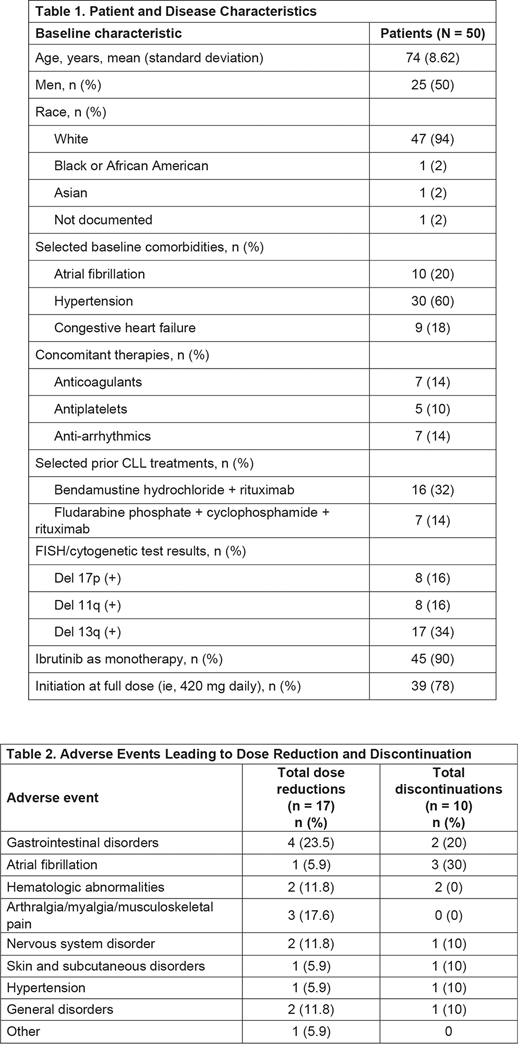Introduction:
Ibrutinib is a Bruton tyrosine kinase inhibitor approved for the treatment of first-line (1L) and relapsed/refractory (R/R) chronic lymphocytic leukemia (CLL). Original approval of ibrutinib was based, in part, on results from the RESONATE and RESONATE-2 studies demonstrating improved efficacy of ibrutinib among R/R CLL patients. Data from the trial reported as few as 4% of participants required dose reduction and 4% discontinued treatment because of adverse events (AEs). Real-world studies have demonstrated that the rates of dose reductions and discontinuations of ibrutinib because of AEs are significantly higher (as high as 25%). The aim of this study was to analyze baseline characteristics of patients with CLL who were treated with ibrutinib in the community setting, as well as the subsequent rates of and reasons for dose reductions and discontinuations.
Methods:
We conducted a retrospective chart review of 50 randomly selected patients of RCCA, a large medical oncology group in New Jersey with 13 practices over 30 sites that services approximately 1200 patients with CLL annually. Patients with a diagnosis of CLL were included if ibrutinib therapy was started between March 2014 and June 2019, and they had a minimum of 6 months of follow-up on therapy and were 18 years of age or older. Exclusion criteria were participation in a trial involving ibrutinib, active treatment for another malignancy, and pregnancy. The index date was defined as the date of novel agent initiation. De-identified data collected for descriptive analysis were used to summarize patient and disease characteristics, as well as to identify reasons for dose reduction and discontinuation.
Result:
50 Patients with CLL were included in this analysis; 21 (42%) received ibrutinib as 1L therapy and 29 (58%) for R/R disease. Patient and disease characteristics at baseline are shown in Table 1. 17 Patients (34%) underwent at least 1 dose reduction. Most dose reductions were due to AEs, and 1 reduction was due to a drug-drug interaction. The most common category of AE that led to dose reduction was gastrointestinal disorders (n=4 [24%]) (Table 2). In our study, 15 patients (30%) discontinued treatment. Of these discontinuations, 10 (66%) were due to AEs, 2 (13%) were due to deaths, and 2 (13%) were due to progression of disease. The most common AE for drug discontinuation was atrial fibrillation (n=3 [20%]) (Table 2). The median follow-up time for all patients was 21.5 months. For those who underwent dose reduction (n=17), median time to dose reduction was 1.9 months. Median time to discontinuation of treatment was 6.9 months overall (n=15), whereas median time to discontinuation specifically due to AEs (n=10) was 3.4 months.
Conclusion:
Patients with CLL who were treated with ibrutinib in the real-world setting frequently experienced dose reductions and treatment discontinuations. In our medical oncology practice, about one-third had their treatment dose reduced and about one-third had treatment discontinued. We found much higher rates than those originally reported in the RESONATE and -2 studies, with rates closer to those found in other real-world analyses. This is probably because patients with preexisting conditions and concurrent medication use may be excluded from clinical trials, resulting in a healthier participant population. For example, based on the RESONATE trial's exclusion of patients taking warfarin or strong CYP3A4/5 inhibitors, about one-fifth of our patients would have been excluded from that study. Further research is still needed to gather population characteristics and responses to therapy that may help guide clinicians in the optimal management of patients with multiple comorbid conditions and concurrent medications who are receiving ibrutinib for CLL.
Du:AstraZeneca: Other: Grant. Fang:AstraZeneca: Other: Grant. Yeung:AstraZeneca: Research Funding. Peng:AstraZeneca: Other: Grant. Keck:AstraZeneca: Other: Grant.
Author notes
Asterisk with author names denotes non-ASH members.


This feature is available to Subscribers Only
Sign In or Create an Account Close Modal